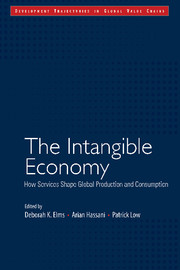Book contents
- Frontmatter
- Contents
- List of Figures, Tables and Boxes
- Acknowledgements
- 1 Introduction
- 2 Contextualizing Services in the World Economy
- 3 Services and Development: Priorities for Reform
- 4 Gainfully Linking into Global Value Chains: A Middle-Income Country's Perspective
- 5 Who Governs Global Value Chains?
- 6 Supply Chain Finance
- 7 Services and Economic Integration in ASEAN
- 8 Indian IT Firms: The Push for Innovation
- 9 Leveraging Business Process Outsourcing for Growth
- 10 Services in Global Value Chains and the Impact of Policy
- Contributors
- Index
- Development Trajectories in Global Value Chains
1 - Introduction
Published online by Cambridge University Press: 19 October 2018
- Frontmatter
- Contents
- List of Figures, Tables and Boxes
- Acknowledgements
- 1 Introduction
- 2 Contextualizing Services in the World Economy
- 3 Services and Development: Priorities for Reform
- 4 Gainfully Linking into Global Value Chains: A Middle-Income Country's Perspective
- 5 Who Governs Global Value Chains?
- 6 Supply Chain Finance
- 7 Services and Economic Integration in ASEAN
- 8 Indian IT Firms: The Push for Innovation
- 9 Leveraging Business Process Outsourcing for Growth
- 10 Services in Global Value Chains and the Impact of Policy
- Contributors
- Index
- Development Trajectories in Global Value Chains
Summary
The literature on global value chains (GVCs) has been growing fast over the past decade. It is diffused and has to deal with a rapidly changing world. The authors contributing to this collection of essays consider contemporary challenges and opportunities facing business and government, which in different ways determine the location, configuration and operation of GVCs. The role of services in GVCs is at the centre of the analysis. Through that prism, the chapters consider the extent to which services can act as a catalyst for fuller GVC participation to promote development, growth and jobs.
In what follows, chapter 2 by Low and Hassani focuses on the role of services in the global economy. It begins with a historical discussion of the distinguishing features of services, and considers some of the reasons for past neglect of the contribution of services to the economy, including their perceived incapacity to contribute to productivity growth. Attention is also paid to definitional challenges, measurability and data issues. Certain shortcomings in these domains have resulted in misleading analysis of the importance of services, especially in trade.
In chapter 3, Findlay discusses the challenges of making services work for development. He argues that there are some common principles among goods and services for the development and design of successful reform packages. However, a number of differences between reforms aimed at goods and those targeting services require closer attention. Political economy considerations related to local political interests may influence attitudes to foreign entry in services markets. If impediments to services affect costs, rather than profits, reform could have significant employment effects. If protection is higher in services markets than in goods markets, domestic services providers will be more severely affected. Where services suppliers are subject to universal services obligations – for example in telecommunications or public transport – the ability to finance these obligations may constitute an additional source of resistance to change.
Abrenica (chapter 4) discusses the challenges facing East Asian economies in surpassing the middle-income trap. Only a handful of these economies have attained developed country status, while a good number seem to be caught in a pit of relative economic stagnation. In mainstream literature, a huge part of the East Asian success story in attaining middle income status is attributed to the use of trade to promote domestic growth and overcome development hurdles.
- Type
- Chapter
- Information
- The Intangible EconomyHow Services Shape Global Production and Consumption, pp. 1 - 4Publisher: Cambridge University PressPrint publication year: 2017

